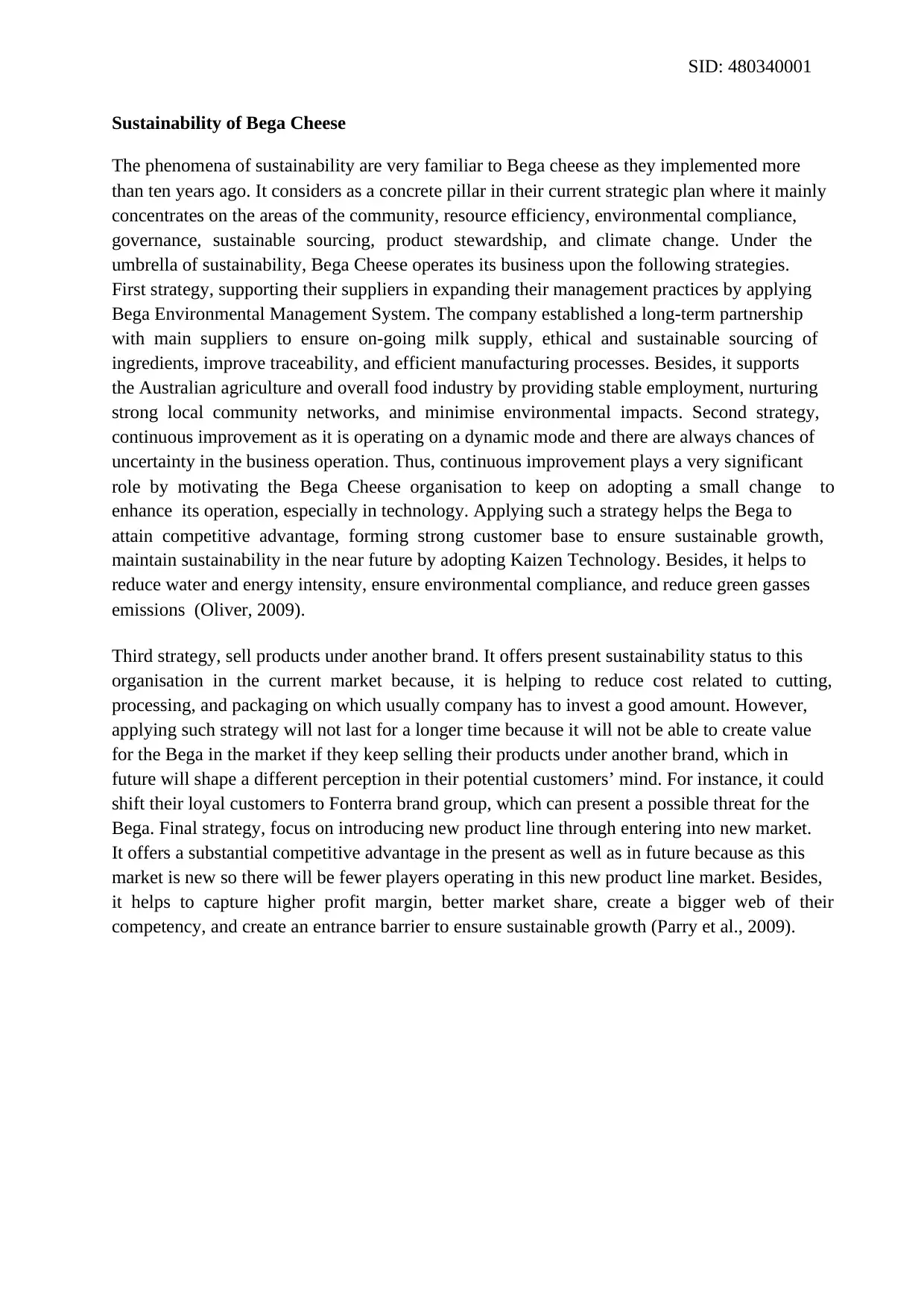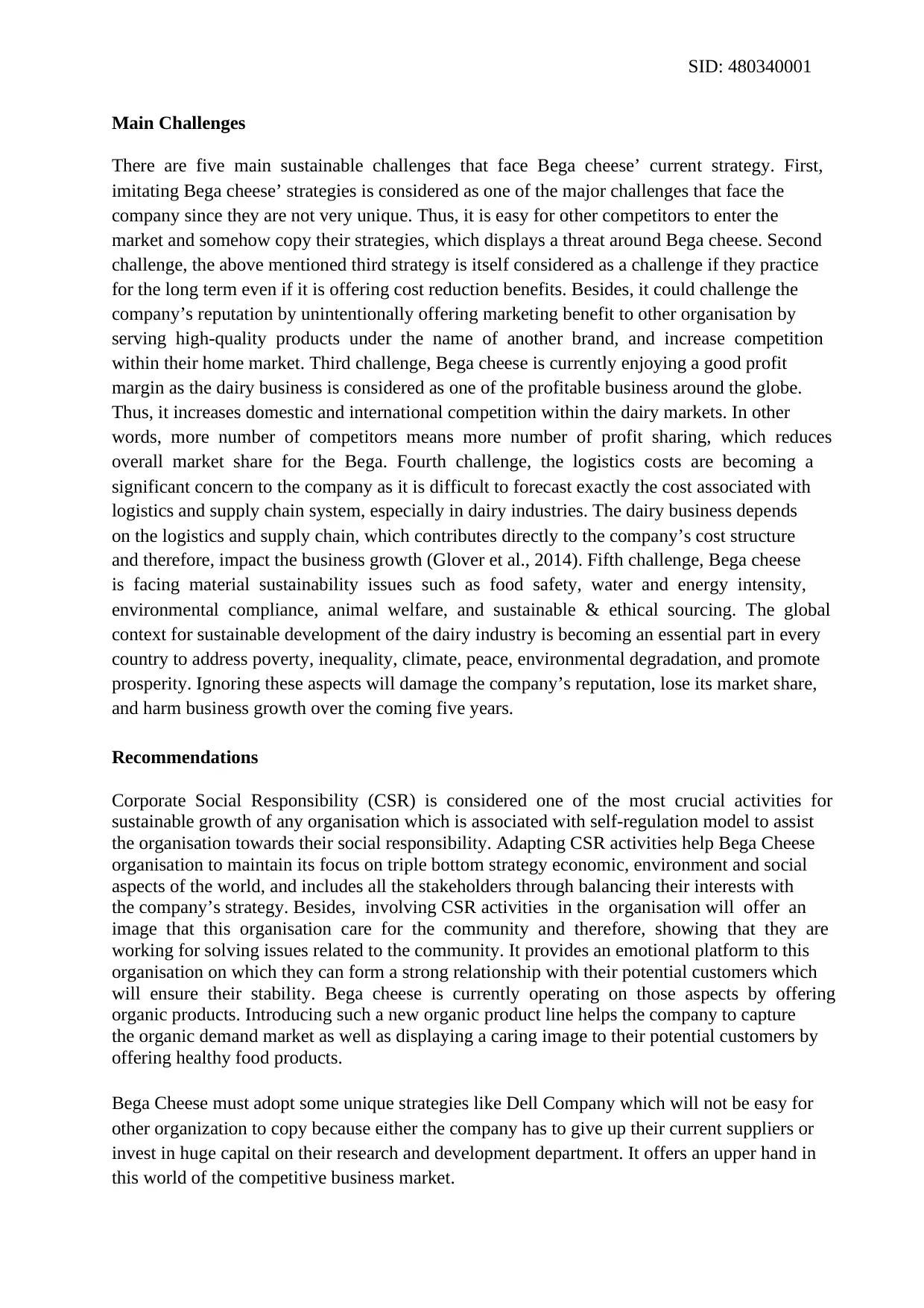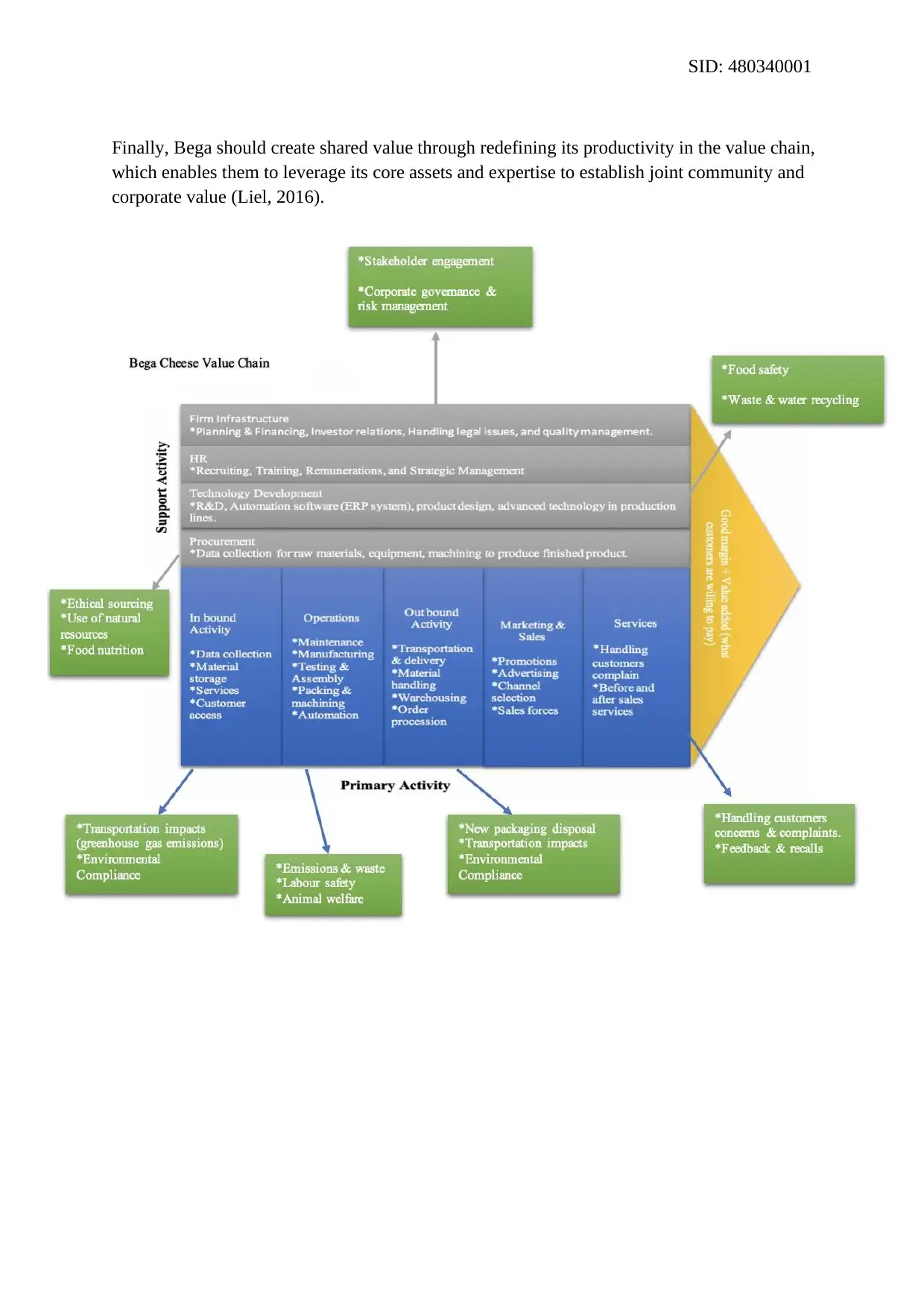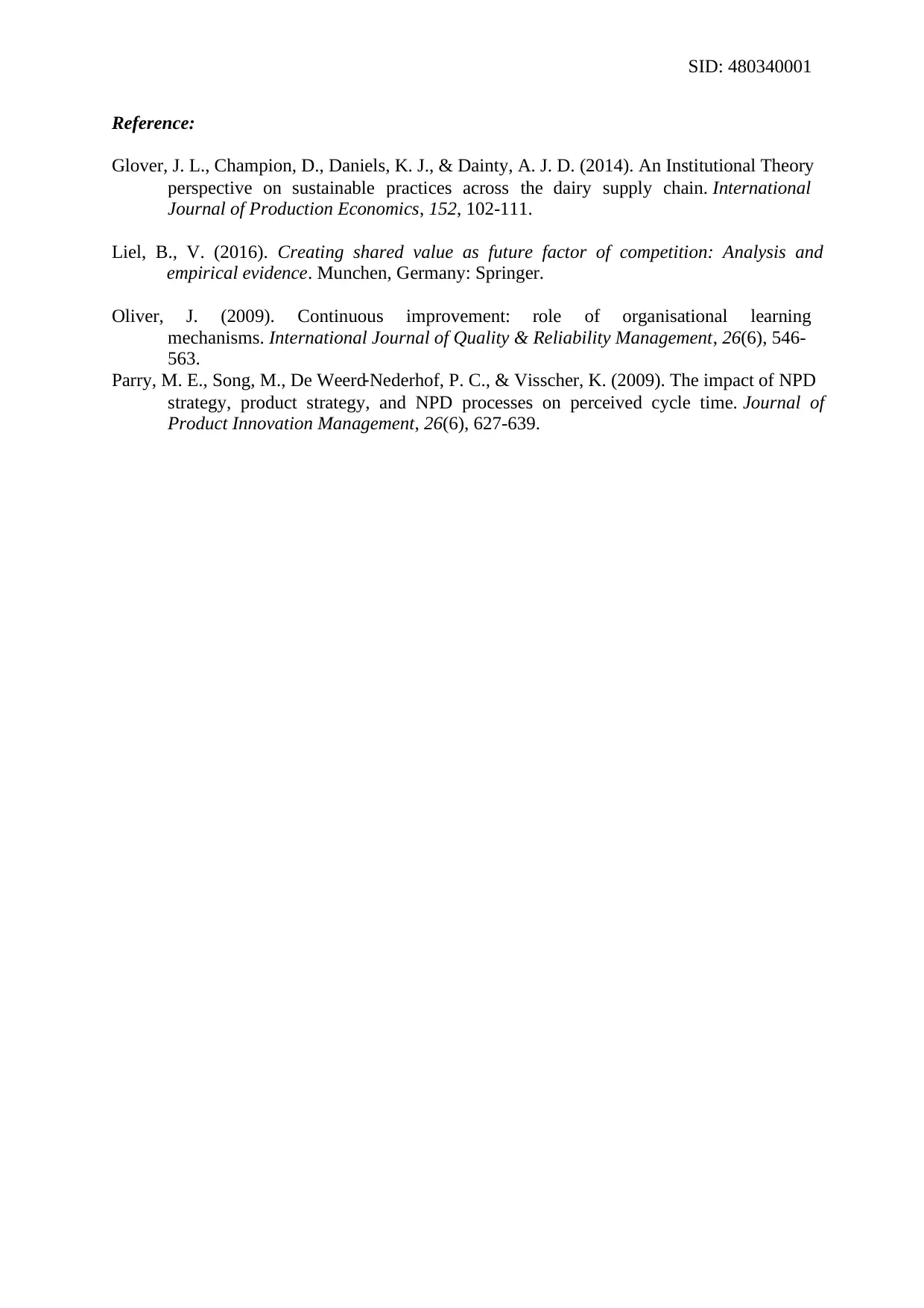Sustainability of Bega Cheese
VerifiedAdded on 2023/04/17
|4
|1108
|210
AI Summary
This document discusses the sustainability strategies implemented by Bega Cheese, including supporting suppliers, continuous improvement, selling products under another brand, and entering new markets. It also highlights the main challenges faced by the company and provides recommendations for sustainable growth.
Contribute Materials
Your contribution can guide someone’s learning journey. Share your
documents today.

SID: 480340001
Sustainability of Bega Cheese
The phenomena of sustainability are very familiar to Bega cheese as they implemented more
than ten years ago. It considers as a concrete pillar in their current strategic plan where it mainly
concentrates on the areas of the community, resource efficiency, environmental compliance,
governance, sustainable sourcing, product stewardship, and climate change. Under the
umbrella of sustainability, Bega Cheese operates its business upon the following strategies.
First strategy, supporting their suppliers in expanding their management practices by applying
Bega Environmental Management System. The company established a long-term partnership
with main suppliers to ensure on-going milk supply, ethical and sustainable sourcing of
ingredients, improve traceability, and efficient manufacturing processes. Besides, it supports
the Australian agriculture and overall food industry by providing stable employment, nurturing
strong local community networks, and minimise environmental impacts. Second strategy,
continuous improvement as it is operating on a dynamic mode and there are always chances of
uncertainty in the business operation. Thus, continuous improvement plays a very significant
role by motivating the Bega Cheese organisation to keep on adopting a small change to
enhance its operation, especially in technology. Applying such a strategy helps the Bega to
attain competitive advantage, forming strong customer base to ensure sustainable growth,
maintain sustainability in the near future by adopting Kaizen Technology. Besides, it helps to
reduce water and energy intensity, ensure environmental compliance, and reduce green gasses
emissions (Oliver, 2009).
Third strategy, sell products under another brand. It offers present sustainability status to this
organisation in the current market because, it is helping to reduce cost related to cutting,
processing, and packaging on which usually company has to invest a good amount. However,
applying such strategy will not last for a longer time because it will not be able to create value
for the Bega in the market if they keep selling their products under another brand, which in
future will shape a different perception in their potential customers’ mind. For instance, it could
shift their loyal customers to Fonterra brand group, which can present a possible threat for the
Bega. Final strategy, focus on introducing new product line through entering into new market.
It offers a substantial competitive advantage in the present as well as in future because as this
market is new so there will be fewer players operating in this new product line market. Besides,
it helps to capture higher profit margin, better market share, create a bigger web of their
competency, and create an entrance barrier to ensure sustainable growth (Parry et al., 2009).
Sustainability of Bega Cheese
The phenomena of sustainability are very familiar to Bega cheese as they implemented more
than ten years ago. It considers as a concrete pillar in their current strategic plan where it mainly
concentrates on the areas of the community, resource efficiency, environmental compliance,
governance, sustainable sourcing, product stewardship, and climate change. Under the
umbrella of sustainability, Bega Cheese operates its business upon the following strategies.
First strategy, supporting their suppliers in expanding their management practices by applying
Bega Environmental Management System. The company established a long-term partnership
with main suppliers to ensure on-going milk supply, ethical and sustainable sourcing of
ingredients, improve traceability, and efficient manufacturing processes. Besides, it supports
the Australian agriculture and overall food industry by providing stable employment, nurturing
strong local community networks, and minimise environmental impacts. Second strategy,
continuous improvement as it is operating on a dynamic mode and there are always chances of
uncertainty in the business operation. Thus, continuous improvement plays a very significant
role by motivating the Bega Cheese organisation to keep on adopting a small change to
enhance its operation, especially in technology. Applying such a strategy helps the Bega to
attain competitive advantage, forming strong customer base to ensure sustainable growth,
maintain sustainability in the near future by adopting Kaizen Technology. Besides, it helps to
reduce water and energy intensity, ensure environmental compliance, and reduce green gasses
emissions (Oliver, 2009).
Third strategy, sell products under another brand. It offers present sustainability status to this
organisation in the current market because, it is helping to reduce cost related to cutting,
processing, and packaging on which usually company has to invest a good amount. However,
applying such strategy will not last for a longer time because it will not be able to create value
for the Bega in the market if they keep selling their products under another brand, which in
future will shape a different perception in their potential customers’ mind. For instance, it could
shift their loyal customers to Fonterra brand group, which can present a possible threat for the
Bega. Final strategy, focus on introducing new product line through entering into new market.
It offers a substantial competitive advantage in the present as well as in future because as this
market is new so there will be fewer players operating in this new product line market. Besides,
it helps to capture higher profit margin, better market share, create a bigger web of their
competency, and create an entrance barrier to ensure sustainable growth (Parry et al., 2009).
Secure Best Marks with AI Grader
Need help grading? Try our AI Grader for instant feedback on your assignments.

SID: 480340001
Main Challenges
There are five main sustainable challenges that face Bega cheese’ current strategy. First,
imitating Bega cheese’ strategies is considered as one of the major challenges that face the
company since they are not very unique. Thus, it is easy for other competitors to enter the
market and somehow copy their strategies, which displays a threat around Bega cheese. Second
challenge, the above mentioned third strategy is itself considered as a challenge if they practice
for the long term even if it is offering cost reduction benefits. Besides, it could challenge the
company’s reputation by unintentionally offering marketing benefit to other organisation by
serving high-quality products under the name of another brand, and increase competition
within their home market. Third challenge, Bega cheese is currently enjoying a good profit
margin as the dairy business is considered as one of the profitable business around the globe.
Thus, it increases domestic and international competition within the dairy markets. In other
words, more number of competitors means more number of profit sharing, which reduces
overall market share for the Bega. Fourth challenge, the logistics costs are becoming a
significant concern to the company as it is difficult to forecast exactly the cost associated with
logistics and supply chain system, especially in dairy industries. The dairy business depends
on the logistics and supply chain, which contributes directly to the company’s cost structure
and therefore, impact the business growth (Glover et al., 2014). Fifth challenge, Bega cheese
is facing material sustainability issues such as food safety, water and energy intensity,
environmental compliance, animal welfare, and sustainable & ethical sourcing. The global
context for sustainable development of the dairy industry is becoming an essential part in every
country to address poverty, inequality, climate, peace, environmental degradation, and promote
prosperity. Ignoring these aspects will damage the company’s reputation, lose its market share,
and harm business growth over the coming five years.
Recommendations
Corporate Social Responsibility (CSR) is considered one of the most crucial activities for
sustainable growth of any organisation which is associated with self-regulation model to assist
the organisation towards their social responsibility. Adapting CSR activities help Bega Cheese
organisation to maintain its focus on triple bottom strategy economic, environment and social
aspects of the world, and includes all the stakeholders through balancing their interests with
the company’s strategy. Besides, involving CSR activities in the organisation will offer an
image that this organisation care for the community and therefore, showing that they are
working for solving issues related to the community. It provides an emotional platform to this
organisation on which they can form a strong relationship with their potential customers which
will ensure their stability. Bega cheese is currently operating on those aspects by offering
organic products. Introducing such a new organic product line helps the company to capture
the organic demand market as well as displaying a caring image to their potential customers by
offering healthy food products.
Bega Cheese must adopt some unique strategies like Dell Company which will not be easy for
other organization to copy because either the company has to give up their current suppliers or
invest in huge capital on their research and development department. It offers an upper hand in
this world of the competitive business market.
Main Challenges
There are five main sustainable challenges that face Bega cheese’ current strategy. First,
imitating Bega cheese’ strategies is considered as one of the major challenges that face the
company since they are not very unique. Thus, it is easy for other competitors to enter the
market and somehow copy their strategies, which displays a threat around Bega cheese. Second
challenge, the above mentioned third strategy is itself considered as a challenge if they practice
for the long term even if it is offering cost reduction benefits. Besides, it could challenge the
company’s reputation by unintentionally offering marketing benefit to other organisation by
serving high-quality products under the name of another brand, and increase competition
within their home market. Third challenge, Bega cheese is currently enjoying a good profit
margin as the dairy business is considered as one of the profitable business around the globe.
Thus, it increases domestic and international competition within the dairy markets. In other
words, more number of competitors means more number of profit sharing, which reduces
overall market share for the Bega. Fourth challenge, the logistics costs are becoming a
significant concern to the company as it is difficult to forecast exactly the cost associated with
logistics and supply chain system, especially in dairy industries. The dairy business depends
on the logistics and supply chain, which contributes directly to the company’s cost structure
and therefore, impact the business growth (Glover et al., 2014). Fifth challenge, Bega cheese
is facing material sustainability issues such as food safety, water and energy intensity,
environmental compliance, animal welfare, and sustainable & ethical sourcing. The global
context for sustainable development of the dairy industry is becoming an essential part in every
country to address poverty, inequality, climate, peace, environmental degradation, and promote
prosperity. Ignoring these aspects will damage the company’s reputation, lose its market share,
and harm business growth over the coming five years.
Recommendations
Corporate Social Responsibility (CSR) is considered one of the most crucial activities for
sustainable growth of any organisation which is associated with self-regulation model to assist
the organisation towards their social responsibility. Adapting CSR activities help Bega Cheese
organisation to maintain its focus on triple bottom strategy economic, environment and social
aspects of the world, and includes all the stakeholders through balancing their interests with
the company’s strategy. Besides, involving CSR activities in the organisation will offer an
image that this organisation care for the community and therefore, showing that they are
working for solving issues related to the community. It provides an emotional platform to this
organisation on which they can form a strong relationship with their potential customers which
will ensure their stability. Bega cheese is currently operating on those aspects by offering
organic products. Introducing such a new organic product line helps the company to capture
the organic demand market as well as displaying a caring image to their potential customers by
offering healthy food products.
Bega Cheese must adopt some unique strategies like Dell Company which will not be easy for
other organization to copy because either the company has to give up their current suppliers or
invest in huge capital on their research and development department. It offers an upper hand in
this world of the competitive business market.

SID: 480340001
Finally, Bega should create shared value through redefining its productivity in the value chain,
which enables them to leverage its core assets and expertise to establish joint community and
corporate value (Liel, 2016).
Finally, Bega should create shared value through redefining its productivity in the value chain,
which enables them to leverage its core assets and expertise to establish joint community and
corporate value (Liel, 2016).

SID: 480340001
Reference:
Glover, J. L., Champion, D., Daniels, K. J., & Dainty, A. J. D. (2014). An Institutional Theory
perspective on sustainable practices across the dairy supply chain. International
Journal of Production Economics, 152, 102-111.
Liel, B., V. (2016). Creating shared value as future factor of competition: Analysis and
empirical evidence. Munchen, Germany: Springer.
Oliver, J. (2009). Continuous improvement: role of organisational learning
mechanisms. International Journal of Quality & Reliability Management, 26(6), 546-
563.
Parry, M. E., Song, M., De Weerd‐Nederhof, P. C., & Visscher, K. (2009). The impact of NPD
strategy, product strategy, and NPD processes on perceived cycle time. Journal of
Product Innovation Management, 26(6), 627-639.
Reference:
Glover, J. L., Champion, D., Daniels, K. J., & Dainty, A. J. D. (2014). An Institutional Theory
perspective on sustainable practices across the dairy supply chain. International
Journal of Production Economics, 152, 102-111.
Liel, B., V. (2016). Creating shared value as future factor of competition: Analysis and
empirical evidence. Munchen, Germany: Springer.
Oliver, J. (2009). Continuous improvement: role of organisational learning
mechanisms. International Journal of Quality & Reliability Management, 26(6), 546-
563.
Parry, M. E., Song, M., De Weerd‐Nederhof, P. C., & Visscher, K. (2009). The impact of NPD
strategy, product strategy, and NPD processes on perceived cycle time. Journal of
Product Innovation Management, 26(6), 627-639.
1 out of 4
Related Documents
Your All-in-One AI-Powered Toolkit for Academic Success.
+13062052269
info@desklib.com
Available 24*7 on WhatsApp / Email
![[object Object]](/_next/static/media/star-bottom.7253800d.svg)
Unlock your academic potential
© 2024 | Zucol Services PVT LTD | All rights reserved.





